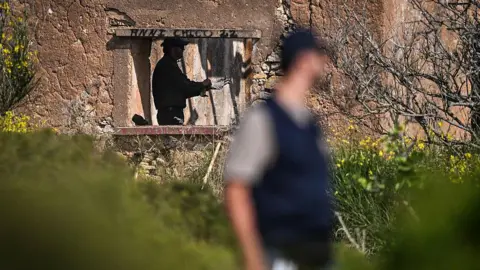Madeleine McCann search goes on but is it 18 years too late?
22 minutes agoDaniel SandfordUK correspondentReporting fromAlgarve, Portugal

 AFP via Getty Images
AFP via Getty ImagesThe golden sandy beach of Praia da Luz is dominated by huge cliffs to the east, a mix of orange sandstone and black volcanic rock. These cliffs hide the strip of gorse scrubland which runs east to the larger resort of Lagos, and are dotted with derelict, abandoned agricultural buildings and houses, marked with missing roofs and chipped plaster.
The cliff path that makes its way over the cliffs from Praia da Luz to Lagos is the last stage of Portugal’s famous Trilho dos Pescadores (Fishermen’s Trail).
This week, with the weather pleasantly cool, hundreds of tourists are walking this trail, but
Because once again detectives are searching for clues as to what happened to Madeleine McCann, the three-year old British girl who went missing in May 2007, making the little seaside resort of Praia Da Luz famous for all the wrong reasons.
Less than a mile from where she disappeared from, press photographers with long lenses trying to get pictures are playing cat and mouse with officers from the Policia Judiciaria – the Portuguese equivalent of the FBI.
How can it be that 18 years on, this beauty spot dotted with ruined buildings, is being searched again? How was it not searched more thoroughly at the time?
Madeleine’s disappearance and the stories always accompanied by pictures of her with blonde hair and large eyes, have made news around the world for almost two decades now. But the story of the police investigations is a pitiful one.

 Family handout
Family handoutWhen she first disappeared her parents struggled to get the Portuguese authorities to take it seriously, turning to the media to make appeals for anyone who might have seen her.
The apartment from which she vanished while her parents were having a meal at a nearby restaurant on the holiday complex was not properly sealed off, so vital forensic clues were lost.
Searches at the time were not rigorous and seemed unstructured. For a while, her own parents Gerry and Kate McCann fell under suspicion.
On and off tensions between the Portuguese and British police ran through those early years. From 2011, the Metropolitan Police took the lead, spending more than £13m. Fresh searches took place in 2014 but it seemed that time had obscured any evidence that might lead to the person responsible for her abduction.
Then in 2020, everything changed when prosecutors in Braunschweig, Germany, and officers from the BKA (Bundeskriminalamt) – the German equivalent of the FBI – said they had a suspect. Not just a suspect for the disappearance of Madeleine, but a suspect for her murder – a word never used by the British police.
It became clear that their suspect is Christian Brückner, who was jailed in Germany in 2019 for raping an elderly American woman in Portugal in 2005.
A drifter and petty criminal, he had spent much of his time between 2000 and 2017 in the Algarve.
The Braunschweig prosecutors, led by Hans Christian Wolters, believe Brückner may have committed many more sexual offences in Portugal.
But he was acquitted at a trial last year of three counts of rape and two counts of sexually assaulting children. Through his lawyers he has also adamantly denied any link to Madeleine.
The publicly-known evidence against him is based on comments he is alleged to have made to a friend about Madeleine’s death, and on the fact a phone linked to him was in Praia da Luz on the night she disappeared.
It now seems that there was some data available to the Portuguese police all along about who might have been in the town that night. Data that could have been mapped against known criminals, and that might have led to more targeted searches in 2007 or the years that followed.
But as we stand on the Trilho dos Pescadores watching the German detectives searching through ruined buildings and old wells for Madeleine’s body or anything that might give some clues to her disappearance, it all feels like it is eighteen years too late.

